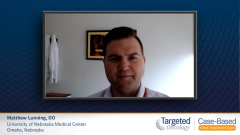
Second-Line Therapy Options in DLBCL
Dr Matthew Lunning reviews second-line treatment options for patients with R/R DLBCL and provides insight on individualizing therapy.
Matthew Lunning, DO: In this setting regimens like R-ICE, [rituximab, ifosfamide, carboplatin, etoposide], R-DHAP, [rituximab, dexamethasone, cytarabine, cisplatin], or R-GDP [rituximab, gemcitabine, dexamethasone, cisplatin]—which are likely equivalent second-line regimens that may induce a response amenable to be consolidated with an autologous stem cell transplant—would be reasonable discussions to have. In this setting you’re talking about a potential curative intent.
However, some patients may not want to elect to go onto intensive chemotherapy and an auto transplant, understanding that without doing this, this may not lead to further therapies being performed with curative intent. In that setting, if they do have all the information and know that potentially they’re deferring a curative intent second-line therapy…. Given that this is coming back within 9 months from the end of her frontline therapy, this is one of those types of diffuse large B-cell lymphomas that I would argue is poor risk and runs a high risk of not obtaining a response amenable to transplant. But you don't know that unless you actually get that second-line regimen from that standpoint.
If a patient wasn’t going to go toward an autologous stem cell transplant-consolidated regimen, I’m not sure that I would choose second-line regimens like ICE [ifosfamide, carboplatin, etoposide] or DHAP [dexamethasone, cytarabine, cisplatin]without the intent to go on to consolidated transplant. If the patient decides that the transplant is not for them, then I’m not sure that I would use those regimens without that intent. Then in this case, given the tafasitamab, lenalidomide data in the second- and third-line settings, this would be a reasonable option given that she had what one could consider a very short remission duration to chemotherapy, likely denoting an underlying biology that would be “chemotherapy refractory” or less likely to respond to a second-line standard chemotherapy-based regimen, or for instance a gemcitabine-based regimen like gemcitabine, oxaliplatin.
Another option in the second line, in a nontransplant setting, would be bendamustine, polatuzumab, rituximab. And in this case again, looking at the data regarding the duration of remission, while this might be an option, I also get concerned about the chemotherapy refractoriness potentially of this disease.
Transcript edited for clarity.
Case: A 71-Year-Old Woman with R/R DLBCL
Initial presentation
- A 71-year-old woman presented with fatigue, weight loss and pruritus
- PMH: HTN, medically controlled
- PE: palpable axillary and femoral lymphadenopathy; palpable spleen 3 cm below the midclavicular line
- ECOG PS 1
Clinical Workup
- Labs: Hb 9.8 g/dL, LDH 2x ULN; renal and hepatic function WNL
- Hepatitis B, C and HIV negative
- Excisional biopsy of a right enlarged axillary lymph node confirmed DLBCL, GCB subtype
- IHC positive for: CD10, CD20
- FISH panel: t(14;18) translocation with BCL2 rearrangement, no MYC or BCL2 rearrangements
- Flow cytometry: CD19-postitive
- Whole body PET/CT scan showed FDG avidity in the bilateral axillary and femoral regions, largest lymph node 3.6 cm in right axillary space; splenomegaly
- Bone marrow biopsy showed involvement of DLBCL in the bone marrow
- Ann Arbor stage IVa DLBCL, GCB subtype
- IPI score high-risk
Treatment
- Treated with R-CHOP x 6 cycles
- First post-treatment PET/CT scan unremarkable; metabolic CR based on Deauville criteria
- 9 months later there was relapse of disease with new cervical and mediastinal lymphadenopathy
- Core needle biopsy of a cervical lymph node confirms a relapse of DLBCL, GCB subtype
- She was offered ASCT but deferred
- Initiated tafasitamab + lenalidomide










































